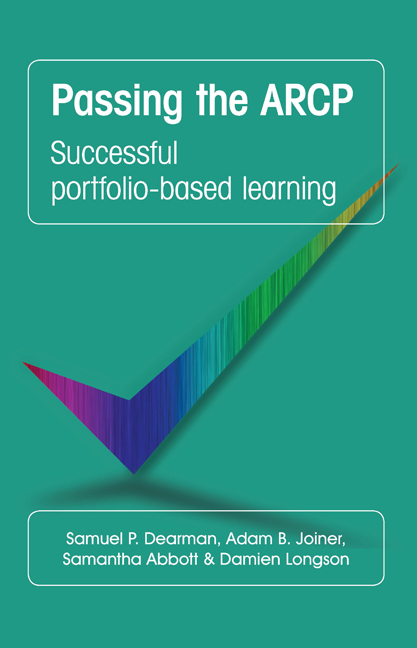Book contents
- Frontmatter
- Contents
- Authors
- List of figures
- Foreword
- Preface
- Acknowledgements
- List of abbreviations
- How to use this guide
- 1 Quick reference guide
- 2 What is a portfolio?
- 3 Lessons learned so far
- 4 Organising the portfolio
- 5 Managing your workplace-based assessments
- 6 Reflective practice and self-appraisal of learning
- 7 Audit and research
- 8 Teaching
- 9 Psychotherapy experience
- 10 Management and leadership experience
- 11 Appraisal reports, planning meetings and educational objectives
- 12 Other experiences, achievements and documents
- 13 The future of portfolios
- Index
7 - Audit and research
- Frontmatter
- Contents
- Authors
- List of figures
- Foreword
- Preface
- Acknowledgements
- List of abbreviations
- How to use this guide
- 1 Quick reference guide
- 2 What is a portfolio?
- 3 Lessons learned so far
- 4 Organising the portfolio
- 5 Managing your workplace-based assessments
- 6 Reflective practice and self-appraisal of learning
- 7 Audit and research
- 8 Teaching
- 9 Psychotherapy experience
- 10 Management and leadership experience
- 11 Appraisal reports, planning meetings and educational objectives
- 12 Other experiences, achievements and documents
- 13 The future of portfolios
- Index
Summary
This chapter relates to experience and competence concerning audit, research, publications, posters and presentations, and how to best present this work. Everybody's PDP should contain an element of research, and trainees are usually expected to complete at least one audit annually. A key point to remember here is to be orderly and present audit in the audit section and research in the research section: there is nothing more frustrating for the academically minded psychiatrist than when audit and research are confused with each other.
Audit
Clinical audit is a quality improvement process which aims to better outcomes. Usually this would be done through aiming to meet predetermined standards.
As one's career develops, one, hopefully, becomes increasingly experienced and autonomous with audit ideas and projects. It may be valuable to start with a short statement of acquired skills with respect to audit, personal views on the role of audit in mental health services and the psychiatric trainee's role with reference to what the curriculum requires and how this contributes to professional development planning. The portfolio demonstrates trainees’ current level of ability and experience. With this in mind, it might be useful to present work in context of experience and past projects. Therefore, one method of presenting audit experience might be in chronological order:
• personal audit history (shows track record)
• current audit(s) (as required)
• planned audits or ideas (shows acquisition of skills, PDP, etc.).
Give a brief abstract for each audit such that the reader knows exactly what has been done and what skills were involved, including personal level of involvement, method, results and any changes or improvements that have occurred as a result. A hypothetical example of how this might look is provided in Box 7.1.
In this example it is very clear what the reasons for the audit were, the involvement of the trainee and any outcomes as a result. All audits may not be impressive or groundbreaking but the format shown in Box 7.1 allows trainees to effectively communicate the necessary information easily and succinctly. The ARCP and appointment panels are particularly interested when trainees are able to close the audit cycle, particularly when they are able to show improvement. It must be remembered that reporting even a successful audit does not necessarily evidence one's competence in completing a project.
- Type
- Chapter
- Information
- Passing the ARCPSuccessful Portfolio-Based Learning, pp. 39 - 44Publisher: Royal College of PsychiatristsFirst published in: 2017



